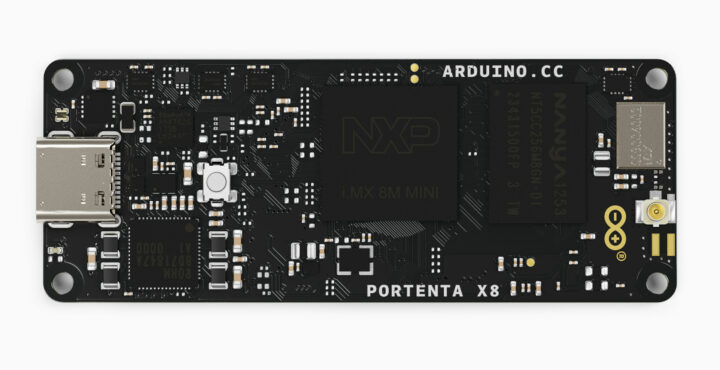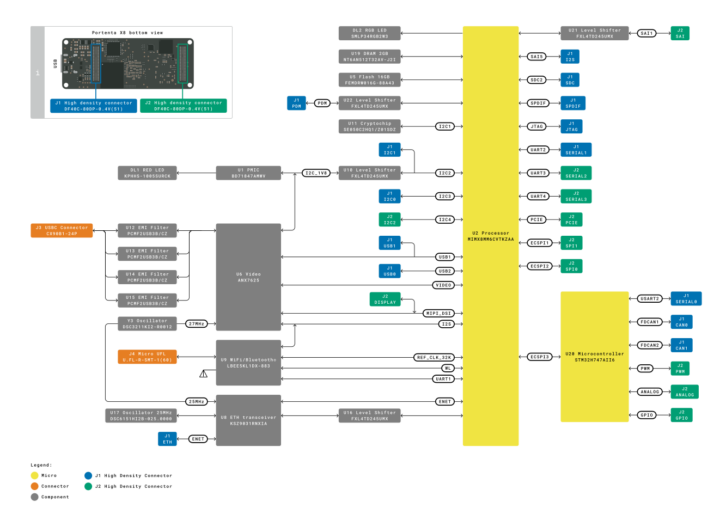In simpler times, Raspberry Pi was making Arm Linux SBC’s, and Arduino MCU boards, but after Raspberry Pi got into the MCU business last year, it’s now time for Arduino to introduce its first Arm Linux board with the Arduino Portenta X8.
The new board since comes with the same STM32H7 Cortex-M7/M4 microcontroller found in the Portenta H7 boards, but add a more powerful, Linux-capable NXP i.MX 8M Mini processor with four Cortex-A53 cores and a Cortex-M4 core, coupled with 2GB RAM and a 16GB eMMC flash.
 Arduino Portenta X8 specifications:
Arduino Portenta X8 specifications:
- SoC – NXP i.MX 8M Mini Arm Cortex-A53 quad-core up to 1.8 GHz,1x Cortex-M4 real-time core up to 400MHz.
- Microcontroller – STMicro STM32H747AII6 Cortex-M7 @ 480 MHz + M4 @ 240 MHz MCU with 2MB dual-bank Flash memory, 1 MB RAM, Chrom-ART graphical hardware accelerator
- System Memory – 2GB LPDDR4
- Storage – 16GB eMMC flash
- Connectivity
- Gigabit Ethernet interface
- 802.11 b/g/n WiFi 4 and Bluetooth 4.1 (Infineon CYW4343W)
- Video I/F – MIPI DSI & CSI interfaces via 80-pin expansion connector, DisplayPort over USB-C port
- USB – 1x USB 2.0 Type-C port for power (PD), programming, and DisplayPort output
- I/Os – 2x 80 pin high-density connectors with CAN, PCIe, SAI, MIPI, DSI, SPI, I2S, I2C, UART, PDM
- Security – NXP SE0502 secure element, PSA from Arm
- Power Supply – 5V via USB-C port
- Dimensions – 66.04 x 25.4 mm
- Temperature Range – -40°C to +85°C

Since Arduino does not have the expertise to provide a secure Linux system for enterprise customers, the company collaborated with Foundries.io who help develop embedded Linux IoT and Edge solutions for the Arduino Pro Portenta X8, notably making sure the board is Arm SystemReady IR compliant, and providing a customizable Linux microPlatform OS with support for security and incremental Over The Air (OTA) updates.
The NXP processor runs a Yocto-based Linux distribution (4x Cortex-A53) and FreeRTOS? (Cortex-M4), while the STM32H7 microcontroller is still programmable with the Arduino IDE or Arduino Cloud. The new board keeps the high-speed connectors but loses the Arduino MKR headers found in Portenta boards. More technical details may be found on the documentation page.
As noted in the comments below, this is not the first Arduino board running Linux, as MIPS-based Arduino Yun and Arduino Yun Rev 2 were launched in 2013 and 2018 respectively. The Portenta X8 is however the first Arm Linux board from Arduino and is much more powerful than boards from the Arduino Yun family.
Just like other Portenta boards, the Portenta X8 is part of the Arduino Pro family for industrial and enterprise use, and the board will be selling for 199 Euros or $239 US once it becomes available in mid-April.

Jean-Luc started CNX Software in 2010 as a part-time endeavor, before quitting his job as a software engineering manager, and starting to write daily news, and reviews full time later in 2011.
Support CNX Software! Donate via cryptocurrencies, become a Patron on Patreon, or purchase goods on Amazon or Aliexpress




